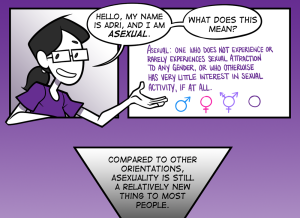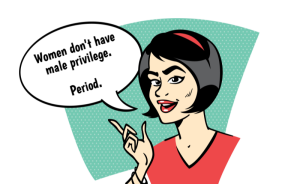
Source: The Doctor’s Channel
Deciphering which messages from the media and which embedded cultural codes are ones we want to listen to and ones we need to examine and fight against can be tough, especially when the process by which we are socialized allows for so much of our cultural conditioning to take place without our knowledge.
When it comes to sexuality and feminism, one of the biggest roadblocks that we face – both in unlearning our own education and in teaching others – is how these social messages conflict with our own authenticity.
The question we often find ourselves asking is: What are some ways in which we can transform public thought about sexual “norms” and reconcile our feminist beliefs with social norms surrounding sex?
Because, seriously, those “social norm” messages are everywhere. And we need to be talking about them.
As I was scanning magazine covers recently, I noticed four headlines on Cosmo that were upsetting at best.
Given that Cosmo is one of the most readily-consumed and accessible “sources” by which women “acquire knowledge” about sex and relationships, I think it’s fitting to use its headlines as a starting point to look at how social sexual norms affect how we think about sex and sexuality.
So let’s take a look, shall we?
12 Kinky Quickies: Grab Him and Get It On!
According to this gem of social sexual propaganda, to be an active agent in your sexual experiences (the grabbing of one’s partner), one must also be seeking to “be kinky” or have quickies, which are usually perceived to be void of emotional closeness.
Desiring these types of sexual experiences is great, but positioning them as an ideal or something that all women should strive for is not.
Media representations of sex are markedly shorter and less intimate than in reality. And a tenet of feminism is to strive for an egalitarian type of reciprocity in a sexual relationship.
When we are constantly having the patriarchal dichotomy of man/woman, butch/femme, bear/twink (which always politically favors the traditionally masculine-associated individual in the dyad) superimposed upon our lived experiences, it distorts the way we think about what “normal” sex is and therefore impacts our behaviors.
A major way in which social thought about sex goes awry is through the consumption of pornography.
Objectification of women’s bodies is often seen as the impetus for sex, and the infusion of hierarchical sexual ideals into what are touted socially and culturally as “norms” contrasts the feminism that we are fighting to uphold today.
This objectification is still playing out when we’re supposedly putting women at the forefront of aggression and sexual desire.
This newly forming ideal for a woman to be open to anything, to have kinks and wild desires, to be dominant in the bedroom with her male partner(s) is still, at the end of the day, an ideal rooted in patriarchal structures.
It says, “Men want this, so be this.”
And there is still danger in women bending their own sexual needs for those of someone else and society.
Therefore, having a conversation about your beliefs surrounding this issue and really listening to those of your partner(s) is an important first step and can lead to insight into why a person holds certain sexual values.
The Sexy Power Issue: How to Get What You Want in Bed, at Work, in Life!
If anyone were to wonder why the pervasive myth that successful businesswomen must have slept their way to the top still exists, look no further!
Popularizing notions – and even going so far as to forgive and suggest them! –that women look for ways to “use their power” to get what they want is also a vehicle for patriarchal thinking.
This type of thinking equates bed, work, and life for women and aims at ensuring women’s subordinate role – on top of adding more to the ever-present pressure of “having it all.”
Enlightened sexism is a term that has become increasingly popular in the last several years, and this is a perfect example of why this headline can be seen as empowering for many women.
The idea behind enlightened sexism is that if you feel that you are making a choice to use your “sexiness” as power or as a tool at work, that you are empowered and free from oppression because you chose to do it.
However, this deceptive sense of “choosing” cannot really be freedom.
The line between objectification and sexual empowerment has become convoluted over time. By pursuing this type of false empowerment, we are actually endorsing the script that perpetuates stereotypes and myths about female sexuality.
Our sexuality – indeed, our “feminine wiles” – needs not be used as a way to achieve success. Our sexuality is only one part of ourselves, not our go-to for whenever we’re in need.
And this sounds obvious. Because it is.
But when our media repeatedly spit this idea back at us with new packaging, it can be easy to forget.
The Ambition Gap: When Your Dreams Are Bigger Than His
The implicit heteronormativity in this sentence aside, the more salient issue is that the assumption is that there is something “wrong” or “abnormal” about your (feminine) dreams being “bigger” than your (masculine) partner’s.
Size isn’t really an accurate way to measure someone’s dreams, and in het relationships, the patriarchy strikes again in its attempt to ensure that men’s dreams should be more ambitious than women’s.
There is no way to ascribe value to a person’s dreams, and being supportive of your partner’s dreams and goals should be a given.
The idea that a woman should feel less than enthralled by having strong ambitions – and that men should be intimidated and turned off by women’s success – is a sure-fire way to keep women second-guessing themselves and their dreams.
If you feel that there are issues arising because of differences in ambitions, then maybe you need to have a conversation with your partner about why you value your goals – and why they should, too.
The Scary Thing 90% of Men Fantasize About
Depending on a person’s sexual preferences and values, they may hold lots of ideas about sex that you don’t understand or simply don’t share.
That doesn’t mean that they’re “unnatural” or worse than yours. It just means that you have different needs or desires.
We need to remember that everyone has different ideas about what makes for enjoyable intimate experiences. In order to have good communication about the intimacy we share, we need to make sure we are expressing honesty within our personal boundaries about what we feel comfortable doing.
When it comes to feminist ideals, two issues are especially relevant here.
First, be aware of how past negative or traumatic sexual experiences have huge impacts on how a person experiences sex and the things they might desire.
Maintaining a safe environment for all individuals is paramount to constructing an equal relationship. Being intentional about creating boundaries that work for you and your partner(s) can help you achieve a balance of power.
Second, be aware that many social “norms” and taken-for-granted notions about sex stem from patriarchal priorities.
And this is one of the benefits of engaging in a feminist relationship: You can make all of your own rules because you don’t ascribe to traditional masculine- and male-oriented values and needs!
The ‘Big O’ Should Not Be a Top Priority
Orgasms are great. I love them as much as the next person. But they should never, ever be the end-all, be-all of sexual experience.
And not only because the journey is as amazing as the destination.
But also because when it is, that added pressure to “perform” or please your partner can create power imbalances and lead to negative experiences.
Too often, we use language such as “achieving” or “reaching” orgasm, as if only the “best” sexual partner can help you get there – and as if it’s a gift given to you by a man, rather than a normal physiological response that your body has.
And these ideas put a lot of onus on our male partners. It makes our orgasms about their abilities, rather than about our pleasure.
It is our job as feminists to work to change the language that is commonly used so that less value is placed on an outcome derived from male-centered sexuality.
Our sexuality is ours.
We can own it.
***
Our sexuality should not (and cannot) be guided by anyone but us.
If we can work with our partner(s) to establish what we find important and what we value, we can constantly work to direct our own sexual world instead of being guided by traditional norms and Cosmo how-to headlines.
[ultimatesocial_facebook custom_class=”fb-btn-us”] [ultimatesocial_twitter custom_class=”tw-btn-us”]
Want to discuss this further? Login to our online forum and start a post! If you’re not already registered as a forum user, please register first here.
Lauren Rosenthal is a Gemini with aspirations of helping people (and herself) move toward authenticity. She enjoys reading and spending time with people and cats. Lauren’s main interests of activism are awareness surrounding sexual and gender diversity, women and body issues, and ageism as an invisible but pervasive form of oppression. Aimless musings and other thoughts of hers can be read on her personal blog, and she loves e-conversing with anyone interested in the history of feminism and what it means for women of all ages today. Read her articles here.
Search our 3000+ articles!
Read our articles about:
Our online racial justice training
Used by hundreds of universities, non-profits, and businesses.
Click to learn more




















